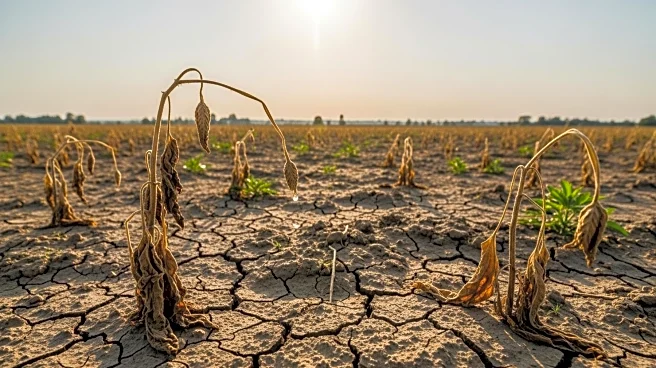What's Happening?
In the UK, a groundbreaking agricultural experiment is underway as the country's first rice crop is set to be harvested following an exceptionally hot summer. Nadine Mitschunas, the UK's pioneering rice grower, has successfully cultivated rice in four small paddy fields in East England. This initiative, part of a trial by the UK Centre for Ecology and Hydrology (UKCEH), aims to explore the potential of growing rice in the UK as climate change alters traditional agricultural practices. The trial includes nine rice varieties from different countries, such as Colombia and Japan, and is conducted on the farm of Craig and Sarah Taylor. The project seeks to address the challenges of food production and farmer livelihoods in a changing climate.
Why It's Important?
This experiment is significant as it explores the adaptation of agriculture to climate change, potentially transforming the UK's food production landscape. With rising temperatures, crops like rice, traditionally grown in tropical climates, may become viable in the UK. This could diversify the agricultural sector and reduce reliance on imports. Additionally, the project addresses environmental concerns, as growing rice on peat soils could help lock in greenhouse gases, mitigating climate change impacts. The success of this trial could lead to sustainable farming practices that balance food production with environmental conservation, benefiting both farmers and the broader ecosystem.
What's Next?
The trial's outcomes could influence future agricultural policies and practices in the UK. If successful, rice cultivation might expand, providing a new crop option for farmers. The government, already showing interest, may consider supporting similar initiatives to enhance food security and environmental sustainability. Further research will be needed to optimize rice cultivation techniques and assess long-term impacts on greenhouse gas emissions. The project could serve as a model for other regions facing similar climate challenges, potentially leading to global shifts in agricultural practices.
Beyond the Headlines
The trial highlights the broader implications of climate change on agriculture, emphasizing the need for innovative solutions to ensure food security. It also raises questions about the balance between traditional farming and new practices, as well as the economic implications for farmers transitioning to new crops. The project underscores the importance of interdisciplinary collaboration in addressing complex environmental issues, involving ecologists, farmers, and policymakers. As climate change continues to impact global agriculture, such initiatives could pave the way for resilient and sustainable food systems.











